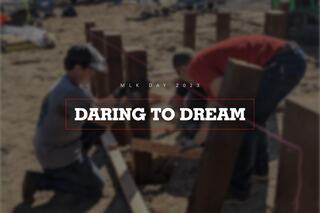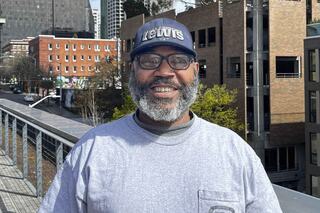Employee Spotlight: Carpenter Foreman Shaun Hagler

In celebration and recognition of the important work Dr. Martin Luther King did to combat hate, racism and discrimination, we will hear from Carpenter Foreman Shaun Hagler on his experience in the construction industry, as well as how to support the success and longevity of BIPOC in our industry.
Shaun Hagler grew up in New Jersey before moving to Seattle at ten years old. “It was a big environmental adjustment. In the late seventies and early eighties, there were far more minorities living in the Central District of Seattle. At that time, it wasn’t Martin Luther King Jr. Way; it was Empire Way,” Shaun said.
Shaun joined the carpenters union nearly 25 years ago. At the time, he was 28 years old, had graduated from college and was looking for the right career. No one had talked to him about the construction industry or what a career in carpentry could look like until a friend recommended joining the union.
“I was naive as a first-period apprentice,” Shaun said. “I didn’t know carpenters could work in high-rises or that they worked on major concrete jobs. I was ignorant to what a well-rounded carpenter skillset would require.”
In addition to being new to the trades, Shaun attributes this to a lack of opportunity and information, less opportunities for Black, Indigenous and People of Color (BIPOC), and a history of nepotism and discrimination in our industry. Even once he joined the union, it wasn’t an easy path; Shaun recalled several times when he heard racial slurs and threats of violence while working early in his career.
“I have lived in New Jersey, New York, Atlanta, Oregon and Washington and I have been called the ‘N-word’ more times in Oregon and Washington than any other place combined. I have been threatened to be lynched twice and called other derogatory slang terms,” Shaun recalled. He says the industry has come a long way since he started, but it clearly still has a lot of work to do.
“When you are a minority, you feel like you have the label on your back, representing your whole ethnic group. When you find yourself coming up against ignorance and discrimination, you have to handle it with class and professionalism whenever possible,” he said.
Shaun says that there are a few ways we can continue to progress. The first is for companies to open conversations, have committees that advocate for BIPOC in the industry and put diversity in their focus. He said he likes working at Lewis because of the work Lewis’ Diversity, Equity and Inclusion (DEI) Committee does to support minorities in our industry. Shaun says the second way to increase access is to have more opportunities, outreach, and information available to BIPOC.
“There just isn’t enough diversity,” Shaun said. “It took two or three years for me to meet another African American carpenter in my union. In my almost 25 years in this industry, I can still count the number of people who look like me on the one hand.”
Lastly, Shaun says it is up to field leaders to make jobsites safer and more accessible for BIPOC. There is an opportunity to educate and inform people because, more and more often, jobsites employ people of all races, genders and sexual orientations. When he talks about diversity and inclusion, he says he is not just fighting for the black carpenter; he is fighting for everybody.
Mentorship and allyship can make or break someone’s experience and career in construction. Ideally, minorities on every jobsite could look to a leader and see someone who has overcome similar experiences or adversity. But more than anything, having someone to recognize your work and help you identify opportunities for career growth is a critical first step in making jobsites accessible and equitable for everyone.
“Being a mentor or an ally to someone really starts with earning their trust. It creates an opportunity to talk about your experience,” Shaun said. “The second piece is communicating openly and honestly.”
While our industry has made considerable progress in recent years, construction jobsites across the nation do not reflect the communities in which we work. Construction companies must continue to fight racism and discrimination while finding real opportunities for BIPOC to join, learn and thrive in their field.
“If you don’t allow yourself to get caught up in ignorance, you realize we are all the same underneath and we all want the same things in life,” Shaun said.
In celebration and recognition of the important work Dr. Martin Luther King did to combat hate, racism and discrimination, we will hear from Carpenter Foreman Shaun Hagler on his experience in the construction industry, as well as how to support the success and longevity of BIPOC in our industry.
Shaun Hagler grew up in New Jersey before moving to Seattle at ten years old. “It was a big environmental adjustment. In the late seventies and early eighties, there were far more minorities living in the Central District of Seattle. At that time, it wasn’t Martin Luther King Jr. Way; it was Empire Way,” Shaun said.
Shaun joined the carpenters union nearly 25 years ago. At the time, he was 28 years old, had graduated from college and was looking for the right career. No one had talked to him about the construction industry or what a career in carpentry could look like until a friend recommended joining the union.
“I was naive as a first-period apprentice,” Shaun said. “I didn’t know carpenters could work in high-rises or that they worked on major concrete jobs. I was ignorant to what a well-rounded carpenter skillset would require.”
In addition to being new to the trades, Shaun attributes this to a lack of opportunity and information, less opportunities for Black, Indigenous and People of Color (BIPOC), and a history of nepotism and discrimination in our industry. Even once he joined the union, it wasn’t an easy path; Shaun recalled several times when he heard racial slurs and threats of violence while working early in his career.
“I have lived in New Jersey, New York, Atlanta, Oregon and Washington and I have been called the ‘N-word’ more times in Oregon and Washington than any other place combined. I have been threatened to be lynched twice and called other derogatory slang terms,” Shaun recalled. He says the industry has come a long way since he started, but it clearly still has a lot of work to do.
“When you are a minority, you feel like you have the label on your back, representing your whole ethnic group. When you find yourself coming up against ignorance and discrimination, you have to handle it with class and professionalism whenever possible,” he said.
Shaun says that there are a few ways we can continue to progress. The first is for companies to open conversations, have committees that advocate for BIPOC in the industry and put diversity in their focus. He said he likes working at Lewis because of the work Lewis’ Diversity, Equity and Inclusion (DEI) Committee does to support minorities in our industry. Shaun says the second way to increase access is to have more opportunities, outreach, and information available to BIPOC.
“There just isn’t enough diversity,” Shaun said. “It took two or three years for me to meet another African American carpenter in my union. In my almost 25 years in this industry, I can still count the number of people who look like me on the one hand.”
Lastly, Shaun says it is up to field leaders to make jobsites safer and more accessible for BIPOC. There is an opportunity to educate and inform people because, more and more often, jobsites employ people of all races, genders and sexual orientations. When he talks about diversity and inclusion, he says he is not just fighting for the black carpenter; he is fighting for everybody.
Mentorship and allyship can make or break someone’s experience and career in construction. Ideally, minorities on every jobsite could look to a leader and see someone who has overcome similar experiences or adversity. But more than anything, having someone to recognize your work and help you identify opportunities for career growth is a critical first step in making jobsites accessible and equitable for everyone.
“Being a mentor or an ally to someone really starts with earning their trust. It creates an opportunity to talk about your experience,” Shaun said. “The second piece is communicating openly and honestly.”
While our industry has made considerable progress in recent years, construction jobsites across the nation do not reflect the communities in which we work. Construction companies must continue to fight racism and discrimination while finding real opportunities for BIPOC to join, learn and thrive in their field.
“If you don’t allow yourself to get caught up in ignorance, you realize we are all the same underneath and we all want the same things in life,” Shaun said.
“There just isn't enough diversity. It took two or three years for me to meet another African American carpenter in my union. In my almost 25 years in this industry, I can still count the number of people who look like me on one hand.”
— Shaun Hagler, Carpenter Foreman
